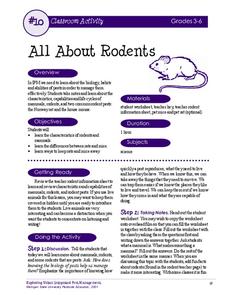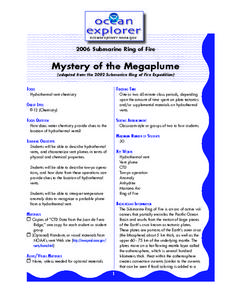Curated OER
Recipe Race Review Game-Enrichment Activity
As an enrichment or review of how to calculate equivalents in your cooking class, you could use this fun game. Plenty of time was put into designing this lesson, and plenty of time will be required for you to understand preparation...
American Chemical Society
Exploring Baking Powder
Meant to follow an activity in which young chemists identified an unknown substance by chemical reactions, they now take their data and use it to determine which materials combine to make up baking powder. This lesson is one that can be...
NOAA
Coastal Dynamics
Life's a beach! The 16th installment of a 23-part NOAA Enrichment in Marine sciences and Oceanography (NEMO) program first examines different types of coasts and how they form. An activity then has learners investigate the shoreline...
NOAA
Vertebrates I
I spy a spine. The 19th installment of a 23-part NOAA Enrichment in Marine sciences and Oceanography (NEMO) program explores vertebrate species, such as sharks and other fish. Learners take part in an activity evaluating the...
NOAA
Technology II
Ping, ping, ping. The last installment of a 23-part NOAA Enrichment in Marine sciences and Oceanography (NEMO) program explores technology use in marine studies, such as sonar. Activity involves simulating sonar techniques to identify a...
NOAA
Marine Policy
Save the oceans! The 22nd installment of a 23-part NOAA Enrichment in Marine sciences and Oceanography (NEMO) program focuses on laws and marine policy. Pupils take part in an activity investigating fisheries stock data.
NOAA
Marine Ecosystems
Be at the top of the food chain when it comes to understanding marine ecosystems. The 21st installment of a 23-part NOAA Enrichment in Marine sciences and Oceanography (NEMO) program investigates marine ecosystems, ocean zones, and food...
NOAA
Sediments
Calcareous ooze ... what an interesting name! The 15th installment of a 23-part NOAA Enrichment in Marine sciences and Oceanography (NEMO) program focuses on sediments found on the ocean floor. After viewing the slideshow lecture,...
NOAA
Invertebrates
Crabs and lobsters ... yum! The 18th installment of a 23-part NOAA Enrichment in Marine sciences and Oceanography (NEMO) program focuses on invertebrate marine life. After the lecture slideshow, learners conduct an activity to sample...
NOAA
Vertebrates II
Mammals of the ocean unite! Or not. The 20th installment of a 23-part NOAA Enrichment in Marine sciences and Oceanography (NEMO) program investigates how warm-blooded marine mammals survive in water. In the class activity, learners use...
NOAA
Ocean Layers II
Now that you know the ocean has layers, let's name them. The seventh installment of a 23-part NOAA Enrichment in Marine sciences and Oceanography (NEMO) program covers terminology associated with ocean layers, such as thermocline and...
August House
Stone Soup
Sharing and cooperation are difficult skills for kindergartners to grasp. Using the story Stone Soup and a series of activities, kids learn about the benefits of working together, categorizing and comparing items, and eating healthy foods.
Rural Science Education Program
Bees and Flowers – Partners in Pollination
Why are bees so important? After several activities where kids investigate the form and function of flowers, they learn about the different types of bees and label them. They then examine pollen under a microscope and decide which bees...
Museum of Disability
Ian’s Walk and Apples for Cheyenne
Help young learners understand friendship and empathy with two reading comprehension lessons. Each activity focuses on a story about a child with autism, and encourages readers to compare and contrast the characters to each other and to...
Curated OER
Tears of Joy Theatre Presents Anansi the Spider
Accompany the African folktale, Anansi the Spider, with a collection of five lessons, each equipped with supplemental activities. Lessons offer multidisciplinary reinforcement in English language arts, social studies, science, and arts...
Michigan State University
All About Rodents
Get to the know the common house mouse and the Norway rat with an activity that reinforces reading comprehension skills. Scholars read a three-page document detailing key information about mammals, specifically rodents, and use their...
NOAA
The Biogeochemical Cycle
The biogeochemical cycle ... no physics? The fourth installment of a 23-part NOAA Enrichment in Marine sciences and Oceanography (NEMO) program introduces the biogeochemical cycle by having pupils simulate movement between Earth's...
NOAA
Tides
Low tides, high tides, spring tides, neap tides, diurnal tides, semidiurnal tides, mixed tides ... just how many types of tides are there? The 10th installment of a 23-part NOAA Enrichment in Marine sciences and Oceanography (NEMO)...
NOAA
El Niño
El Nino, La Nina ... and the Santa Maria? The 11th installment of a 23-part NOAA Enrichment in Marine sciences and Oceanography (NEMO) program explains the mechanism of El Nino/Southern Oscillation. Pupils use previous data to determine...
NOAA
Plankton
Dive into the world of plankton. The 17th installment of a 23-part NOAA Enrichment in Marine sciences and Oceanography (NEMO) program introduces different types of plankton. Young scientists then use what they have learned to classify...
Curated Video
What Makes YouTube Unique
Start off a unit on YouTube with an introduction to the service and all that it offers. Learners watch various video clips before participating in a brief discussion about YouTube. The plan includes an activity based around information...
Lake Science Collaborative
Blood Circulation Simulation
Act out the circulation of blood in the body with an innovative activity. Kids act as either body parts or blood, and carry necessary nutrients and waste throughout different stations to represent the way that oxygen circulates.
Curated OER
A Picture is Worth a Thousand Words: Introduction to Graphing
Students practice graphing activities. In this graphing lesson, students discuss ways to collect data and complete survey activities. Students visit a table and graphs website and then a create a graph website to practice graphing.
Curated OER
Mystery of the Megaplume
Read through the extensive background information and then lead your geology or physical oceanography class through an investigation of actual temperature anomaly data from the Juan de Fuca ridge. They translate the data onto a plot,...
Other popular searches
- Enrichment Activities
- Math Enrichment Activities
- Ela Enrichment Activities
- Enrichment Activities Law
- Eal Enrichment Activities
- Enrichment Activities Usa
- Dtp Enrichment Activities

























